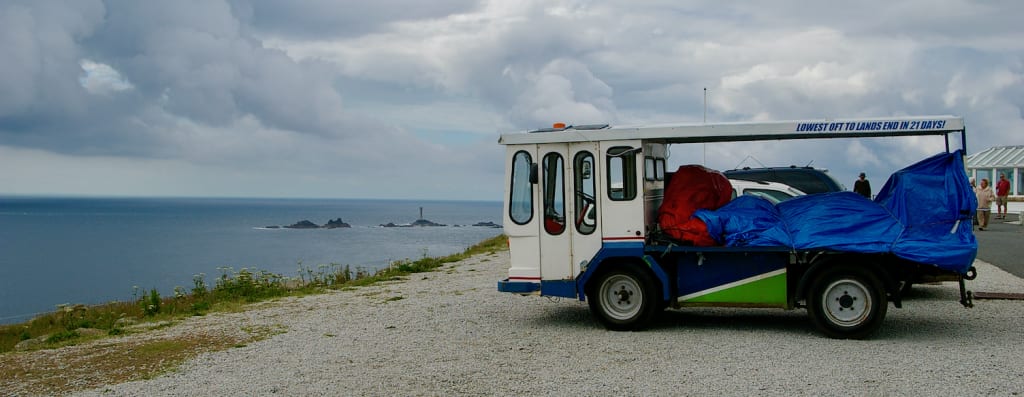
We were almost halfway across England on a beautiful bright June afternoon when a man riding a bicycle that seemed to be slightly too small for him raced towards us, legs whizzing around like sandcastle windmills. He arrived with an offer to help us in any way he could.
It was Sunday, so Salisbury’s city centre car park was almost totally deserted, save for a couple of vehicles — among them our 1958 milk float, which we had spent the last nine days in, quietly toddling along country lanes at a speed that did not quite match the velocity of a bee. We know this now because, a few days later, one overtook us.
We had dreamed up our journey, you won’t be surprised to learn, after a long afternoon in the pub and thought very little of the practicalities until the last moment, perhaps wary of opening up the journey to the cold eye of logic and reason.
As if to underline this approach, whenever we attempted to sort out the logistics of our trip from Lowestoft Ness — Britain’s most easterly point — to Land’s End, our hopes were confounded by the pessimism of experts. Milk-float fleet operators, traction battery specialists and professionals in the field of electric vehicles all said that it just couldn’t be done.
One of the experts actually became quite angry with me for even suggesting otherwise.
On what turned out to be a perfectly feasible three-week journey across the country, we discovered many unexpected aspects of British life, but back in Salisbury, only nine days in, the trip was already an embarrassment of riches.
In one village, we had been promised that we might meet the Queen’s vet, but circumstances dictated otherwise and we had to alter our plans so that we could take tea and rock cakes with the vice-president of the WI instead.
As she offered to be a mother and dispensed relaxed quips about her jam-making skills, her mechanic husband, known to all in the village as Bobble-de-Bob, checked the float for damage from the 2½ft-deep ford we had driven through the night before. It turned out that the ford’s water gauge, which showed a depth of just under a foot, was placed almost two feet up the bank.
Our free vehicle service and elevenses were a far remove from, but no less eccentric or English than, our previous mug of tea, which we brewed up on a camping stove in the teeth of a blattery squall, while our batteries were topped up in a B&Q car park.
He told us he had half a mind to follow us to Cornwall in a fork-lift truck
A few days later, we were given an impromptu two-hour tour of the Hypnos bed factory in Princes Risborough, where managing director Peter Keen told us that he had half a mind to follow us to Cornwall in one of his forklift trucks. A little later on the same day, we were joined by another decommissioned dairy vehicle in a pilgrimage to the Barley Mow — the “once upon a tymefied” pub from Jerome K Jerome’s classic tale and one of the inspirations for our odyssey, Three Men in a Boat.
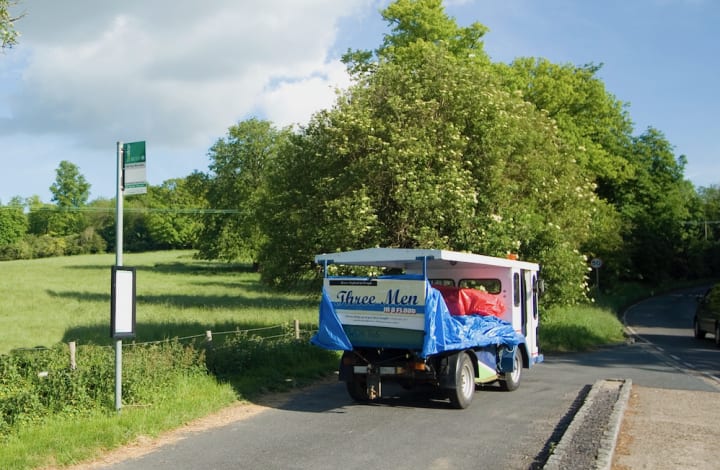
Some of the other surprises of the trip were consequences of our sluggish progress. In keeping with one of our principal aims for the journey, to find a quiet, unhurried England (the float was capable of a rakish 15 mph on level terrain), we travelled at a speed that gave us plenty of time to take in the sights.
Sometimes it was too slow. Road signs became almost completely pointless — we were forever arriving at hazards warned of 200 yards ago, having forgotten the exact nature of the danger. We missed a few turns this way: an instruction to Dan to “turn right at this junction” would be followed by a period of meditation borne on the mournful, lethargic throb of the motor. A minute or two later, the mantra would be broken and we would have to execute a 15-point turn to get our electric cow back on track. Other intervening periods were full of conversation, laughter or detailed observation of the local wildlife and every moment became enriched in this way.
Sometimes, however, the observations were unpleasant. Our leisurely pace gave us the opportunity to rumble towards and then over road kill in a kind of ultra-lethargic bullet time.
There was ample compensation for this slow-motion pan and dolly of death, however. Those truncated snatches of bird song you hear through the car window were allowed their full measure as we trundled silently by. We saw hares in the fields of Suffolk, red kites above Princes Risborough and a scene of unimaginable splendour and tranquillity a few hundred yards from the thundering menace of the A35 in Dorset.
Back in Salisbury, our cross-section of the country thus far had thrown up kindness after kindness, in the shape of free battery charges (the float would take anything from two to eight hours to top up), free accommodation and free beer.
Why was a man on a bike offering us a helping hand, without even being asked?
We started to wonder whether the strangeness and charm of our journey were the key to unlocking a different side of Britain to the one we saw every night on the news. Was there something about being on such an eccentric mission that defused people’s natural suspicions? Was that why a man on a bike was about to offer us a helping hand, without even being asked?
The man was Pat Shelley. Pat runs a guided tour company in Salisbury that specialises in showing tourists around Wiltshire’s archaeological wonders and, perhaps lured by our own piece of the past, he’d stumbled across us and just wanted to help.
“My wife’s going out with the dogs in the car,” said Pat, “so there’s a parking spot in front of the house.” This is a rare occurrence in Salisbury. “Do you want to come and charge your float?” How could we refuse?
So, despite a supreme lack of effort on our part, things were going rather well. After a few minutes spent rewiring Pat’s kitchen, our genius electrician, Prasanth, flicked the charger switch and its comforting buzz became the backdrop to yet another cup of tea.
Who should then turn up but Pat’s friend and neighbour, archaeologist Phil Harding, best known for his television appearances on Channel 4’s Time Team.
“What on earth are you doing?” Phil inquired.
“We’re charging this milk float,” said Pat, knowing full well that it wasn’t a complete answer.
“I can see that, but why?” “Well, I found these guys in the car park. They’re going to Land’s End in that. Isn’t it great? I thought I should help them out.” Dan elucidated with what was becoming a boilerplate explanation of slow travel and our attempt to discover England and the English.
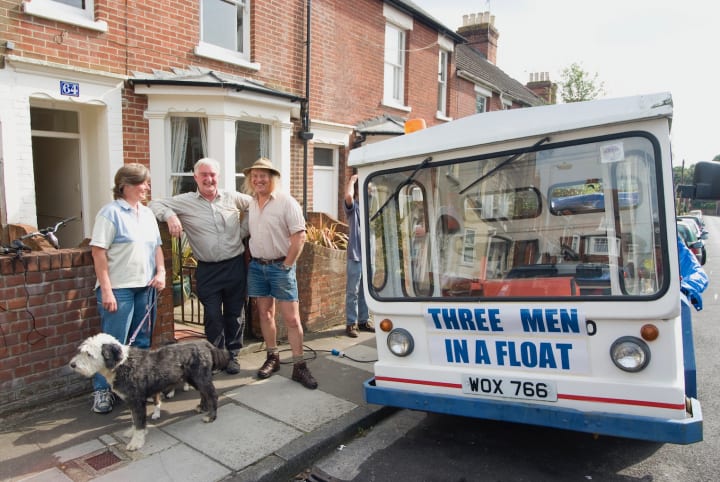
“We’re led to believe that everyone in this country is so jaded and selfish, but people — Pat, for instance, who we’ve never met before — are bending over backwards to help us.”
“I can quite understand why people would lend you a hand because it is just so eccentric, you’ve got to love it,” Phil said. “If you can’t have a laugh at something like that, you might just as well pack up and die. The only other person I can remember who owned a milk float was Keith Moon.”
“He used to drive it around Staines, trying to run people over,” Dan recalled.
“I’ve got a book at home with a picture of Moon and his float,” said Phil. “Should I go home and get it?” “They could pin it up in their cab,” offered Pat — which is how a TV archaeologist supplied a portrait of the Who’s drummer to the occupants of a milk float on a long drive to Cornwall.
Later on in our journey — at the Eden Project in Cornwall — we had an interesting conversation about how fixing the environment fixes a lot of other problems too. Maybe it’s just a question of perspective: You show people that there are different ways to do things and a whole load of other things fall into place.
After Salisbury, our eccentricity became all the more accepted the further west we travelled. By the time we reached Land’s End, our insane quest finally assumed the mantle of normality. It turns out that Land’s End is the national beacon for the indomitable British spirit of silliness and while we were securing our very last charge, the duty manager, Keith, recounted some tales of absurdity roughly on a par with our own.
“There was a man who travelled from end to end in a swimming pool on the back of a lorry. Claimed he had swum all the way, but he didn’t really, did he?”
“Then there was someone on a portable lavatory seat. A guy came from John O’Groats carrying a door, and another was walking backwards. We’ve seen them all, really.”
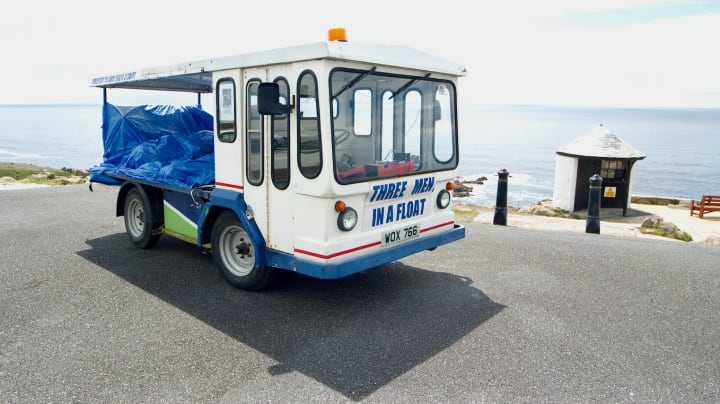
It was all a long way from the predictions of certain failures we had received before we had even set foot in the float and started our trip. But, even by halfway through the journey, we realised that the experts’ pessimism might have been coloured by more than their professional expertise.
It was clear you can’t do this kind of thing at all without cooperation from ordinary members of the public and in our current social climate of fear and suspicion, it may have seemed that that was asking a little too much. In asking for help, in being a little eccentric, in losing ourselves in the British tradition of embarking upon a hopeless mission, we found that almost anything is possible.
About the Creator
Ian Vince
Erstwhile non-fiction author, ghost & freelance writer for others, finally submitting work that floats my own boat, does my own thing. I'll deal with it if you can.


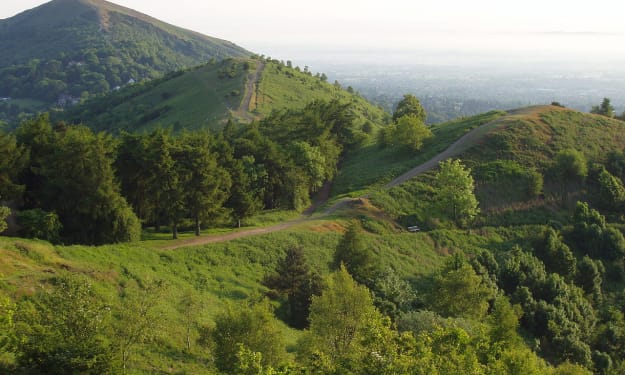
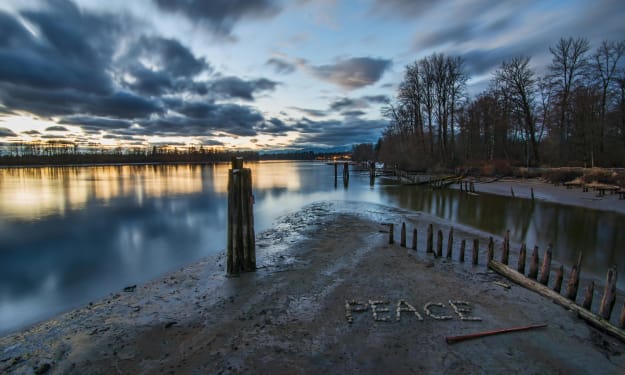


Comments
There are no comments for this story
Be the first to respond and start the conversation.